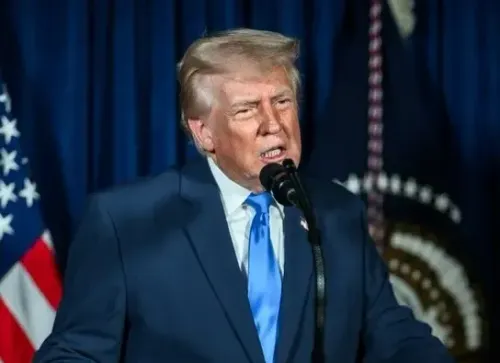Is the EU-US Tariff Deal 'Unsatisfactory' and 'Imbalanced'?

Synopsis
Key Takeaways
- Senior EU lawmaker criticizes trade deal
- 15 percent tariff on EU exports proposed
- EU commits $750 billion for US energy purchases
- Concerns over job security and economic stability
- Investment commitments raise questions
Brussels, July 28 (NationPress) A prominent EU legislator has expressed strong disapproval of a proposed trade agreement between the European Union (EU) and the United States, cautioning that it might jeopardize the bloc's economic stability and job security.
Bernd Lange, who leads the European Parliament's Committee on International Trade, characterized the draft framework—which stipulates a 15 percent tariff on all EU exports to the US—as “unsatisfactory” and “significantly imbalanced.”
He emphasized that this tariff rate would signify a fourfold surge over the current average while the EU would agree to impose zero tariffs on American goods.
“This is a deal with a slant. Clearly, concessions have been made that are difficult to bear,” Lange stated on Sunday.
Earlier, US President Donald Trump and European Commission President Ursula von der Leyen announced that they had reached a trade agreement that would see the US impose a baseline tariff of 15 percent on EU products, according to reports from Xinhua news agency.
Despite both leaders portraying the agreement as a step toward a more “balanced trade” and promoting more equitable commerce, the deal enables Washington to impose broad tariffs while ensuring zero-tariff access for various strategic US exports.
Conversely, the EU has committed to purchase $750 billion worth of American energy and an additional $600 billion in investments within the US.
Lange remarked that while Trump publicly announced a blanket 15 percent tariff during his remarks after the talks, he had previously excluded specific sectors, such as steel and pharmaceuticals.
He added that heightened European acquisitions of US energy, particularly liquefied natural gas, were expected as the EU continues efforts to diminish its dependence on Russian fossil fuels.
However, Lange criticized the additional $600 billion in planned investments, including increased funding for US military technology, branding such initiatives as contrary to European economic interests. He compared the pressure tactics utilized in the deal to those Washington employed in recent negotiations with Japan.
“Overall, this deal will contribute to weakening the EU's economic development and harming its gross domestic product,” he concluded.










